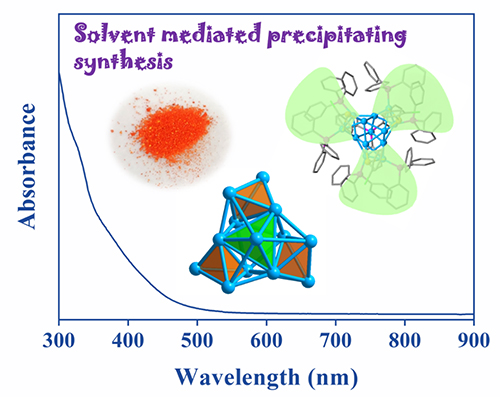Due to exactly atomic composition and crystal structure, atomically precise copper nanoclusters are used as model catalysts for catalytic reaction mechanisms study. However, the efficient synthesis of copper nanoclusters still remains challenging.
Recently, a joint group led by Prof. HUANG Jiahui and Prof. FAN Hongjun from the Dalian Institute of Chemical Physics (DICP) of the Chinese Academy of Sciences (CAS) has developed a new strategy for synthesis of atomically precise copper nanoclusters by solvent-mediated precipitation.
This study was published in Chemical Science on Dec. 20, 2022.

The total crystal structure and absorption optical spectrum of Cu13H10(SR)3(PPh3)7 nanoclusters (Image by LIN XinZhang)
"We named the new strategy as 'solvent-mediated precipitation synthesis (SMPS)', it was realized to efficiently synthesize Cu13H10(SR)3(PPh3)7 nanoclusters where SR was a thiolate ligand," said Prof. HUANG.
The copper nanoclusters, Cu13 for short, were prepared via precipitation, and the excess raw materials and by-products were remained in the solution, solving the problems of separation and low yield of Cu nanoclusters.
Single crystal X-ray diffraction analysis showed that the core of the Cu13 nanocluster with a triple axis of symmetry consists of four vertices-sharing tetrahedrons. Electrospray ionization mass spectrometry and nuclear magnetic resonance spectroscopy confirmed the types and number of hydrogen atoms in Cu13 nanoclusters. Density functional theory calculations simulated the location of 10 hydrides in the crystal structure.
Moreover, steady-state ultraviolet-visible absorption and fluorescence spectra of Cu13 nanoclusters exhibited unique optical absorbance and photoluminescence.
"This study not only provides a novel SMPS strategy for the efficient synthesis of Cu13 nanoclusters, but also explains the relationship between the structure and optical properties of copper nanoclusters," said Prof. HUANG.
The work was supported by the National Natural Science Foundation.